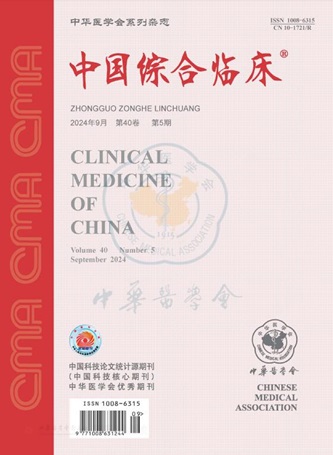Relationship between fasting serum C-peptide level and heart function in patients with or without diabetes mellitus and chronic heart failure
引用次数: 0
Abstract
Objective To evaluate the relationships between admission fasting serum C-peptide concentration and cardiac function status in chronic heart failure (CHF) patients with or without diabetes. Methods From July 2017 to December 2018, 262 CHF patients with or without diabetes in the Department of Cardiology of Pudong hospital in Shanghai were analyzed.Their cardiac function was classified as New York Heart Association (NYHA) grade Ⅱ to Ⅳ, and they were divided into diabetes group (80 cases) and non diabetes group (182 cases). At the same time, 62 subjects without diabetes and heart disease were randomly selected as the control group.To analyze the relationship between fasting serum C-peptide level and cardiac function in diabetic and nondiabetic CHF patients. Results (1)The fasting plasma glucose and serum C-peptide concentrations of diabetes group paitents were(8.7±2.9) mmol/L and(0.78±0.67) nmol/L respectively, the nondiabetes group paitents were(5.8±1.67) mmol/L and(0.56±0.61)nmol/L respectively, the control group were(5.1±0.69) mmol/L and(0.16±0.12)nmol/L respectively.The difference in the three groups was statistically significant(all P 0.05). (2) In all patients with heart failure, diabetes mellitus and non diabetes heart failure, the levels of serum C-peptide were (1.05±0.85), (1.17±0.82), (0.99±0.86) nmol/L in NYHA Ⅳ group, and (0.53±0.22), (0.52±0.20), (0.54±0.23) nmol/L in NYHA Ⅲ group, and (0.32±0.09), (0.32±0.11), (0.31±0.09) nmol/L in NYHA Ⅱ group.After adjustment of age, gender, smoking, insulin secretion and hypoglycemic drugs, body mass index, blood pressure, total bilirubin (TBIL), alanine aminotransferase (ALT), creatinine, blood glucose, blood lipid, white blood cell count (WBC) and hemoglobin level by covariance analysis, all patients with heart failure The level of serum C-peptide in NYHA Ⅳ group was significantly higher than that in Ⅲ group (all P 0.05) (3) Using multiple linear regression analysis, the adjustment factors included age, gender, smoking, BMI, blood pressure, TBIL, alt, creatinine, blood glucose, blood lipid, WBC and hemoglobin levels.The results showed that the serum C-peptide level was positively correlated with pro-BNP in all patients with heart failure, diabetes and non diabetes heart failure (β: 0.006, 95%CI -0.016-0.028 , P=0.007; β: 0.117, 95%CI-0.042-0.277 , P=0.006; β: 0.411, 95%CI-0.149-0.971 , P=0.023), negatively correlated with LVEF(β: -0.122, 95%CI-0.285-0.041, P=0.004; β: -0.008, 95%CI-0.032-0.016, P=0.010; β: -0.065, 95%CI-0.139-0.011, P=0.036). Conclusion The level of fasting serum C-peptide was significantly increased in patients with CHF and non-diabetic patients, and was related to the severity of heart failure. Key words: Chronic heart failure; Diabetes mellitus; Serum C-peptide; N-terminal B-type natriuretic peptide; Cardiac function伴有或不伴有慢性心力衰竭的糖尿病患者空腹血清c肽水平与心功能的关系
目的探讨合并或不合并糖尿病的慢性心力衰竭(CHF)患者入院时空腹血清c肽浓度与心功能状态的关系。方法对2017年7月至2018年12月上海市浦东医院心内科收治的262例合并或不合并糖尿病的CHF患者进行分析。心功能按照纽约心脏协会(NYHA)分级Ⅱ~Ⅳ,分为糖尿病组(80例)和非糖尿病组(182例)。同时,随机选取62名无糖尿病、无心脏病的受试者作为对照组。分析糖尿病和非糖尿病性CHF患者空腹血清c肽水平与心功能的关系。结果(1)糖尿病组空腹血糖和血清c肽浓度分别为(8.7±2.9)mmol/L和(0.78±0.67)nmol/L,非糖尿病组空腹血糖和血清c肽浓度分别为(5.8±1.67)mmol/L和(0.56±0.61)nmol/L,对照组空腹血糖和血清c肽浓度分别为(5.1±0.69)mmol/L和(0.16±0.12)nmol/L。三组间差异均有统计学意义(P < 0.05)。(2)所有心力衰竭、糖尿病及非糖尿病心力衰竭患者血清c肽水平,NYHAⅣ组分别为(1.05±0.85)、(1.17±0.82)、(0.99±0.86)nmol/L, NYHAⅢ组分别为(0.53±0.22)、(0.52±0.20)、(0.54±0.23)nmol/L, NYHAⅡ组分别为(0.32±0.09)、(0.32±0.11)、(0.31±0.09)nmol/L。经协方差分析调整年龄、性别、吸烟、胰岛素分泌及降糖药、体重指数、血压、总胆红素(TBIL)、丙氨酸转氨酶(ALT)、肌酐、血糖、血脂、白细胞计数(WBC)、血红蛋白水平后,所有心衰患者血清c肽水平NYHAⅣ组显著高于Ⅲ组(P均为0.05)(3)采用多元线性回归分析,调整因素包括年龄、性别、吸烟、BMI、血压、TBIL、alt、肌酐、血糖、血脂、白细胞、血红蛋白水平。结果显示,所有心力衰竭、糖尿病和非糖尿病心力衰竭患者血清c肽水平与前bnp均呈正相关(β: 0.006, 95%CI -0.016-0.028, P=0.007;β: 0.117, 95%ci-0.042-0.277, p =0.006;β: 0.411, 95% ci -0.149 ~ 0.971, P=0.023),与LVEF呈负相关(β: -0.122, 95% ci -0.285 ~ 0.041, P=0.004;β: -0.008, 95%ci-0.032-0.016, p =0.010;β: -0.065, 95%ci-0.139-0.011, p =0.036)。结论CHF患者和非糖尿病患者空腹血清c肽水平明显升高,且与心力衰竭的严重程度有关。关键词:慢性心力衰竭;糖尿病;血清c -肽;n端b型利钠肽;心脏功能
本文章由计算机程序翻译,如有差异,请以英文原文为准。
求助全文
约1分钟内获得全文
求助全文
来源期刊
CiteScore
0.10
自引率
0.00%
发文量
16855
期刊介绍:
Clinical Medicine of China is an academic journal organized by the Chinese Medical Association (CMA), which mainly publishes original research papers, reviews and commentaries in the field.
Clinical Medicine of China is a source journal of Peking University (2000 and 2004 editions), a core journal of Chinese science and technology, an academic journal of RCCSE China Core (Extended Edition), and has been published in Chemical Abstracts of the United States (CA), Abstracts Journal of Russia (AJ), Chinese Core Journals (Selection) Database, Chinese Science and Technology Materials Directory, Wanfang Database, China Academic Journal Database, JST Japan Science and Technology Agency Database (Japanese) (2018) and other databases.

 求助内容:
求助内容: 应助结果提醒方式:
应助结果提醒方式:


